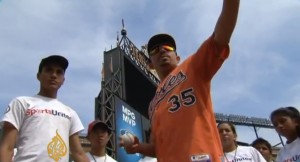
Al Jazeera uses highlights sports diplomacy with Latin and South America to discuss U.S. policy towards Syria.
Yesterday, Al Jazeera English aired a segment discussing the use of “smart power” in the Middle East. Smart power is the combined application of hard and soft power resources to accomplish an objective. It recognizes that neither hard nor soft power strategies are effective on their own in certain situations, and that these elements must complement each other in an effort to achieve a goal. Unfortunately, Al Jazeera’s reporting sheds very little light on how smart power can be employed effectively.
The segment mashes disparate elements of diplomacy and warfare together in a way that misleads the viewer about the proper use of smart power strategies. The clip begins by discussing baseball diplomacy with youth from Latin and South American countries and then compares this to U.S. efforts in Libya and Syria. According to Al Jazeera, using smart power in Syria has not met the “same results” as in Libya.
Yet the Administration’s Syria strategy (if there is one) has hardly mirrored Libya at all. Al Jazeera’s reporting features the Foreign Policy Initiative’s Jamie Fly, who criticizes the notion of “leading from behind,” as the U.S. employed in the case of Libya. However, the United States’ actions with regards to Syria should not truly be considered a smart power effort. The U.S. currently has no official diplomatic presence in Syria, and there is no significant level of soft power engagement. As it stands, current American action is focused on hard power in the form of sanctions. The Annan diplomacy efforts, in actuality aimed at the Syrian regime, could hardly be considered a soft power effort.
The segment ends by returning back to the topic of baseball diplomacy, but makes no effort to explain how this soft power strategy is integrated with hard power elements into a smart power plan for those target countries. Neither does Al Jazeera explain how this even relates to Jamie Fly’s criticism of the Administration’s Syria policy. Instead, the reporter explains that in this case, soft power is being used to hopefully create payoff in case of a future international crisis.
Smart power, despite having a relatively new name, is nothing new. In essence, hard power is meant to compel and soft power is meant to attract. During the Cold War, strategic elements of both were combined to ultimately accomplish the objective of ending the Soviet Union’s threat to the United States. It’s a very basic concept. Is the United States currently employing this type of strategy in Syria? Not really.
Ultimately, it is unfortunate that in its reporting on smart power, Al Jazeera did not actually explore smart power strategies. Future reports on smart power should discuss the concept more accurately, identifying a strategic goal, and exploring if both soft and hard power elements are being employed to achieve that goal.


